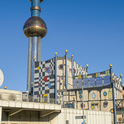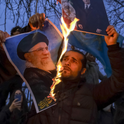The prosecutor's statement yesterday was unambiguous: "justice will be done. History demands it." But at what cost? I've been watching the trial of the former Khmer Rouge leaders unfold here in Phnom Penh, where there is growing concern that the tens, perhaps hundreds of millions of dollars that the trial will cost will be not be spent effectively, even becoming a new source of graft and resentment. It's a subject that weighs heavily on the minds of people like Theary Seng, an author, activist and lawyer, and killing fields survivor.
One evening recently we sat outside the Cantina, a small bar overlooking the Mekong River. It was here, several years earlier, that she told me of a desire to confront 'Brother Number Two', Nuon Chea, and ask him who had killed her parents, and why.
Today, Theary is adamant about the necessity for the tribunal and its wider ramifications for dealing with other dictators, like President Bashir of Sudan. Nuon Chea himself denies any guilt. Despite this, he has been charged with crimes against humanity, along with other surviving members of the Khmer Rouge leadership. These include Kang Guek Eav, also known as Comrade Duch, who ran the S21 extermination centre—and the story of whose discovery and capture was told by Nic Dunlop in a Prospect essay in 1999. Former foreign minister Ieng Sary, his wife Ieng Thirith and the former head of state Khieu Samphan also face trial.
More than 1.7 million people or one-third of the country's total population died during their 1975-79 rule. Two decades of civil war followed before marathon talks between Cambodia and the United Nations finally culminating in the trial currently underway in Phnom Penh.
But the costs of the trial are mounting and the thought of hanging a dollar sign around a Cambodian life horrifies Theary, who says that suspicions abound that money is being siphoned off. Both the US and EU fund the court, which is slated to work to two years, although five could be closer to the mark. Yet new budget forecasts suggest that it needs an additional $44.1 million, on top of its original $56.3 million, just to get to the end of 1999. Such figures worry Theary: "the average Cambodian is living on less than a dollar a day. They can't understand this type of money. Its Monopoly money."
The court is partly run by Cambodia and the UN, and the funding is divided accordingly. But it’s the Cambodian side that insiders say can't make this month’s payroll, and where you find allegations of corruption, kickbacks and bribes to Cambodian staffers to win jobs. Diplomatic sources worry about this, not least because other tribunals have also dramatically exceeded their budgets — especially the UN court in Rwanda, which cost more than $1 billion and tried about 35 cases.
These concerns about cost are made worse by the suspicion that many interest groups would rather see the surviving leaders die of old age, and avoid incriminating evidence splashed across the world's newspapers. China, especially, supported the Khmer Rouge. Senior Cambodian government officials, meanwhile, fear being called to account, while even some NGOs think that Cambodia's corrupt legal system will make the tribunal a farce. Getting things going isn't helped by the fact the defense lawyer Jacques Verges—famous for defending the likes Klaus Barbie and Carlos the Jackal—failed to show up at the tribunal.
Against these odds, its quite an achievement for those lobbying for the court—ranging from ex-UN head Kofi Annan to campaigners like Theary, backed by a majority of the Cambodian people—to have got agreement on the hybrid court model. But the challenges of cost and organisation remain, not least the need to bring entire villages down from the countryside to testify.
Even facing such difficulties, Theary Sang has little doubt that many government minders have their fingers stuck in the tribunal's till. “Look, we know America is not corruption free, we know Japan is not corruption free, we know France is not corruption free" she says. "What we are simply saying is you don't have to be so blatant, crass, crude and obnoxious about it." If they don't, the justice history demands will be a long time coming.
[Editor's Note: Luke Hunt is a freelance journalist, who has covered Cambodia for many years.]
Cambodia's genocide trial: justice, corruption, or both?
March 31, 2009












